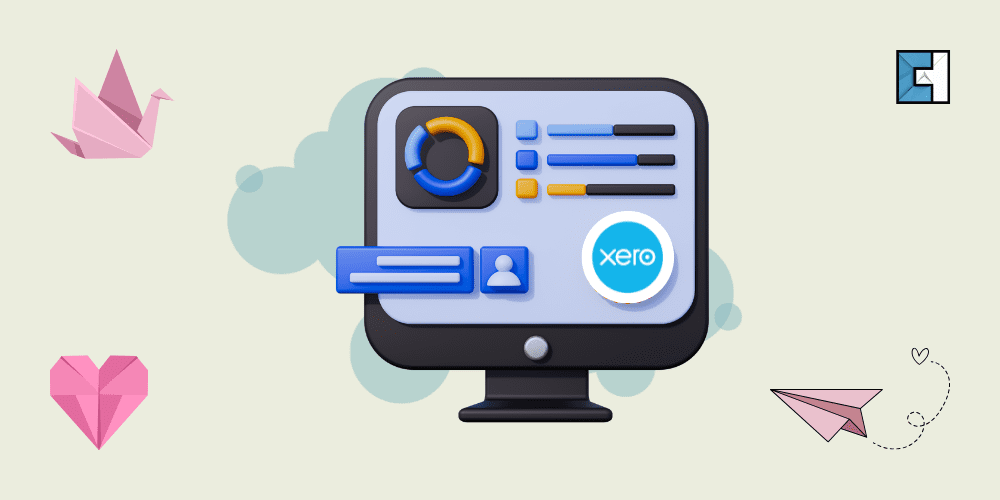Software as a service (SaaS) solutions are becoming more popular, and as a result, new SaaS businesses are being founded every day to meet the need. Why is the Role of a CFO for a SaaS business key to its success? This question runs through the minds of most startup SaaS company founders and is one we plan to address in this article. Our expert SAAS Accountants have worked hard to curate an article which showcases the importance of the role of the CFO for a SAAS business.
Starting a SAAS business, whether bootstrapped or investor-backed, involves navigating numerous financial intricacies. From setting product prices to budgeting, forecasting, and ensuring regulatory compliance, the financial landscape can be daunting for newcomers.
Many SaaS companies realize the need for a CFO during their initial funding rounds. Balancing operational tasks whilst preparing financials for potential investors— like streamlining the chart of accounts, providing management accounts for review, and refining budgeting processes—becomes challenging.
If you’re contemplating a part-time, remote, or virtual CFO, a part-time finance director can provide the necessary guidance on your SaaS journey.
The CEO, CTO, and product manager play essential roles in a SaaS company’s success, but the finance team is the only one that interacts with the client at every stage of the process. Therefore, the CFO role in a SaaS company is strategically key in influencing the direction of the business. A CFO in your SaaS company will assist, as explained below.
Explore essential financial strategies such as cash flow forecasting and budgeting in our in-depth guides to enhance your SaaS startup’s financial management.
What is SaaS?
Software as a service (SaaS) is a paradigm for delivering software over the internet that allows users to pay on a subscription basis for access to cloud-based applications developed and maintained by the cloud provider. Our comprehensive SaaS business startup guide is a great starting point if you are considering starting a SAAS business.
Why work for a SaaS company? Rather than dealing with the hassle of installing and updating software, you may get what you need by simply accessing it online, eliminating the need for costly and time-consuming IT support. The public cloud provider handles everything from servers, operating systems, applications, and firewalls.
Accounting for and reporting on a SaaS firm’s financial health is more complex than usual due to several unique aspects of the business. Proper financial management is frequently the deciding factor between a flourishing SAAS enterprise attracting investors and a failed endeavour that wastes money on activities you cannot sustain.
What is a CFO?
What does the term CFO stand for? A chief financial officer (CFO) is a top-level executive who oversees a company’s financial operations. The CFO is responsible for managing the company’s finances, including monitoring cash flow, making plans for the future, and identifying areas of financial strength and weakness.
A CFO is responsible for a wide range of tasks, including but not limited to hiring and supervising the finance and accounting staff, monitoring revenue and costs, directing financial planning and analysis (FP&A) activities, suggesting mergers and acquisitions (M&A), securing financing, and more.
What does a chief financial officer do?
A CFO’s financial insights and industry understanding allow them to offer suggestions across the board, from supply chain to marketing. The following are the chief financial officer’s roles and responsibilities:
- The most admired CFOs can see what’s coming, collaborate closely with the company’s highest-ranking executives, and aren’t afraid to suggest bold new initiatives.
- The CFO is also answerable to the Securities and Exchange Commission (SEC) in the USA, Companies House in the UK and other regulatory bodies globally to ensure that the company abides by GAAP and other requirements.
- The chief financial officer (CFO) advises the CEO and other executive team members on strategic matters and manages the company’s financial operations.
- The chief financial officer’s responsibilities include ensuring the company meets its sales and profit targets and maintains a steady cash flow for the technology business.
- He also provides strategic guidance to other business unit leaders, helping them increase income and minimise waste.
- The CFO collaborates with other executives to determine human resource needs and allocates funds accordingly.
- The CFO’s job is to assist the CEO in making sound financial choices by providing context for the company’s financial data.
For effective cash flow planning strategies for technology businesses to ensure financial stability and support strategic decision-making.
Benefits of Having a CFO for a SAAS Business
Some of the advantages of a CFO in business are as follows.
- SAAS KPIs and metrics
In addition to the more typical financial indicators like net margin and gross profit, the SaaS CFO’s primary responsibility should be to keep tabs on other crucial KPIs.
Key performance indicators for SaaS include:
- Averaged User Contribution to Revenue
- Retention Percentage
- The Price of Acquiring a New Client
- Potential earnings from an existing customer
- An evaluation of a company’s success based on the proportion of its lifetime value to its customer acquisition cost
- Monthly recurring revenue (MRR)
- Overall Retention Rate
- Sales Days Outstanding
- Repayment Timeframe
- Churn Rate
Keeping tabs on these indicators is essential for monitoring the state of the company’s finances.
- SaaS CFOs Create Finance Teams
You still need other tools for effective financial management, and a SaaS CFO is simply one of them. Accounting and SaaS metric monitoring are just two examples of tasks needing dedicated employees as your business expands.
With analytics, your finance staff may zero in on the most effective client acquisition and retention techniques and highlight possibilities for growth.
For most small organisations, chief financial officers are the best choice for managing their finances. Your existing CFO can assist you in finding a full-time CFO once your SaaS company has outgrown the capacity of a virtual or remote CFO.
- Budget Predicting
Our SaaS CFO services for small businesses make understanding finances simple. Your Chief Financial Officer (CFO) will analyse your cash flows to determine your monthly and annual recurring revenue (MRR/ARR).
Using this information as a starting point, the CFO will analyse your company’s variable revenue to determine its origins and forecast future revenue and profits.
Prediction, of course, largely depends on the nature of your company’s operations. Based on the numerous paths your SaaS company may take, your CFO will create several predictions.
- Discover Fresh Financing Sources
SaaS businesses have enormous funding requirements. These businesses often need help to qualify for loans due to the difficulty of repossessing the company’s property.
The best chief financial officers also know where to look for unconventional finance. A competent CFO may persuade a banker to back your SaaS business by presenting supporting strategy papers. Moreover, a CFO allows you to expand your contact time with them to prepare for financing rounds.
- Reduce Costs and Accelerate Growth
The most significant benefit of hiring a CFO is the money you’ll save from better financial management. A Chief Financial Officer may monitor expenses to identify wasteful ones, such as unused software licenses or unnecessary procedures, that are eating into your profit margins.
A CFO specialising in software as a service (SaaS) may help you assess your marketing and sales strategies to grow your subscription business and attract new clients. They could also reduce the price of acquiring new customers.
- Build a repeatable, profitable sales model
The CFO of a SaaS company helps build and maintain a repeatable sales model that focuses on revenue growth. Achieving this requires a great deal of discipline.
To build a sales model that is consistent, profitable, and repeatable, the CFO must put scalable systems in place, achieve good unit economics, raise Series A/B funding, and measure the company’s sales efficiency metrics.
- CFO’s for Tax Preparation
CFOs aren’t generally tax experts, but they may work with those who are to help find every deduction your company is entitled to. As costs are deducted, the cost to acquire a client drops.
Due to the potential increase in CFO involvement during tax season, hiring a CFO who can provide flexible pricing may be beneficial.
- Acquisition Costs
However, a CFO’s responsibilities extend beyond simple accounting since they must consider Customer Acquisition Cost (CAC) and Customer Lifetime Value (LTV) while formulating financial projections.
While CAC and CLV are often considered marketing KPIs, they are also often used by CFOs in their day-to-day operations. CLV (also known as LTV) and CAC play critical roles in any study of a company’s development.
The Chief Financial Officer uses CAC and LTV to make revenue and cash flow projections. Both CAC and CLV may help assess company trends and formulate channel strategies.
- New Standards in Accounting
Whether you’re prepared or not, the CFO will ensure the implementation of the complex ASC 606 and IFRS 15 rules for revenue recognition.
CFOs should learn about the new guidelines, consider how they could affect their company, and take any necessary steps to be ready.
- Responsibilities in Accounting
A contemporary CFO’s duties often include dealing with accounting, which is a more exciting part of the job. It is the CFO’s responsibility to keep the books in order, whether your SaaS business uses an in-house accountant or an external Accounting firm.
You may get significant insight into your company’s financial health by reviewing several financial reports, such as balance sheets, statements of profit and loss or income, and statements of cash flow management. These analyses provide crucial information for budgeting and other planning tasks.
Having a Chief Financial Officer (CFO) as a staff member gives you access to someone with the training and expertise to decipher and analyse these financial reports, revealing critical information about your company’s financial health.
Although you will transfer most accounting responsibilities to another party, the SaaS CFO handles everything appropriately and is the point of contact for such parties as accountants, lawyers, insurance providers, auditors, investors, etc.

- Expertise and knowledge
One of the primary advantages is having someone with extensive expertise in financial matters working for your company. CFOs have frequently worked in various sectors and enterprises, giving them valuable insight into the common problems and obstacles these organisations face.
Thus, they can put in place the precautions and plans of action essential to overcoming such obstacles and ensuring your firm’s continued success.
- Taking precautions
In-depth knowledge of market trends, specific sectors, and business models means that CFOs may foresee potential pitfalls and obstacles for your company. Given your situation, they can foresee these dangers and difficulties and when they could arise.
Knowing when these difficulties arise may allow you to prepare for them and take appropriate action to minimise or lessen their effect. That is to say, you’ll be able to preventatively manage risks, which might save you time, money, and hassle in the long run.
Guides on understanding various business models and effective risk management strategies to safeguard your small business.
- Time-saving
As a company owner, you have a lot on your plate, and you probably need more time to complete everything that needs to be done. Consider that you are responsible for the financial well-being of your company and its workers and for running the company.
A CFO for a SaaS business can handle all the company’s financial matters. It means you may put all your financial worries in their hands and focus on business growth.
- Human resources
CFOs aid in HR management due to the information they get about the company’s financial situation because they can assess your workforce’s worth to the company and advise you on how much to spend on top hires. In addition, they will back your judgment regarding personnel matters.
- Compliance
A CFO’s extensive knowledge and expertise in compliance are invaluable if you need assistance preparing to file your tax returns. What this means is that you can devote your time and energy where it is most needed—to operate your business—instead of worrying about whether or not you have done all possible to protect your intellectual property.
CFOs are experts in more than just taxes and may help you comply with other regulations affecting your firm, such as those about corporations. That’s why they can assist you in overcoming any compliance issues.
- Designing Products
You need to introduce new items or make changes to your existing product line if you want to succeed in a crowded marketplace so that its features meet the needs of your target audience. Simply put, that’s the only way to maintain your edge over the competition and set yourself out of the pack.
Here, CFOs for a SaaS may advise on how much money is available for product development and what enhancements will impact sales the most. Nevertheless, this is just the beginning.
- Success in Business
The most important advantage of using a CFO for a SaaS Business is that they can help to expand your company further.
Hiring a Chief Financial Officer (CFO) for a SaaS Business may improve your company’s ability to plan, make choices, create new products, and manage its human resources more effectively. Moreover, CFOs can assist you in cutting expenses where it counts.
Challenges of Managing Finances in a SaaS Business
So, it takes a lot of work to run a software-as-a-service (SaaS) business. But, it’s much more challenging to manage the finances of software as a service company.
- Revenue Recognition
SaaS metrics rely heavily on revenue recognition as a foundational element. Recognising revenue entails allocating earnings to the accounting period in which they were generated. SaaS makes this challenging since consumers pay for services in advance (via a biannual or yearly subscription) rather than as provided.
This method distorts examining a company’s performance by increasing reported revenue in one period at the cost of the next. Even worse, it causes ARR and MRR to be incorrectly reported.
- Pricing and Cost per Unit
The pricing strategies of rival companies are often used as a benchmark by SaaS companies. While this might be a solid foundation, focusing entirely on the opposition could be financially disastrous.
It is only possible to tell whether and when a business will be successful by first understanding it’s unit economics.
- Funds Used and Potential Range
SaaS models’ industry and company peculiarities hinder the regular preparation of a simple cash flow statement, leading to a combination of cash and non-cash-based items that might mislead management choices.
A comprehensive understanding of the sources and destinations of cash inflows and outflows is essential to use the Cash flow statement style effectively and to prepare a cash flow forecast. Departmental, sourcing, and supply chain splits are all necessities.
- Management vs. Accounting Data
A company’s financial statements facilitate fact-based decision-making and enhance transparency and accountability among shareholders, owners, and other interested parties regarding the firm’s performance.
Yet, there is often a disconnect between accounting and management reporting, with the two typically operating in parallel. So, which statistics do you keep tabs on?
Reporting tools excel at monitoring operational KPIs, and they do not automatically provide the appropriate indicators from a financial viewpoint. You keep tabs on metrics like new sign-ups, ARR, MRR, and churn. What about top-line numbers like sales, margins, EBITDA, and cash flow?
When everything is said and done, SaaS companies must contend with formal financial reports that range significantly from management data.

Additional Resources
Conclusion:
Why SAAS businesses must have a CFO? The CFO’s responsibilities will broaden to cover more than simply the management of key performance indicators (KPIs) but also the dissemination of information about these metrics to the appropriate parties.
A CFO for a SaaS business will also be responsible for reporting and interpreting these key performance indicators to aid upper-level management in making informed decisions. A Chief Financial Officer will help your company improve its financial management, reduce vulnerability, and craft plans to expand its revenue base.
Not using CFO services when available is the worst error you can make as an early-stage SaaS company owner.









































































